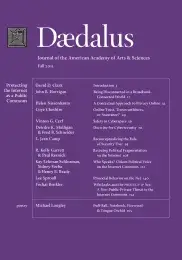Online Trust, Trustworthiness, or Assurance?
Every day, individuals around the world retrieve, share, and exchange information on the Internet. We interact online to share personal information, find answers to questions, make financial transactions, play social games, and maintain professional and personal relationships. Sometimes our online interactions take place between two or more humans. In other cases, we rely on computers to manage information on our behalf. In each scenario, risk and uncertainty are essential for determining possible actions and outcomes. This essay highlights common deficiencies in our understanding of key concepts such as trust, trustworthiness, cooperation, and assurance in online environments. Empirical evidence from experimental work in computer-mediated environments underscores the promises and perils of overreliance on security and assurance structures as replacements for interpersonal trust. These conceptual distinctions are critical because the future shape of the Internet will depend on whether we build assurance structures to limit and control ambiguity or allow trust to emerge in the presence of risk and uncertainty.
The Internet is an extraordinary tool for human interaction, connecting millions of people with various information technologies and systems across a global communication network.1 Despite the advantages of the Internet for communication breadth and efficiency compared to offline interactions, there are legitimate concerns about what it means to trust others in a shared Internet commons. For example, the social cues we rely on to detect risk and uncertainty in the physical world are often unreliable when we do not know who is behind the digital curtain of anonymity. We interact online to share personal information, find answers to questions, make financial transactions, play social games, and maintain professional and personal relationships. Sometimes our online interactions take place between two or more humans using different tools and services, including social networking websites, chat clients, messaging systems, blogs, and forums. In other cases, individuals are not directly involved in information transfers; we allow computer systems to act as agents, managing and exchanging our information according to specific rules and heuristics.
In each type of interaction mentioned above, risks and uncertainties complicate our decisions. Should we post pictures from a recent party to a social networking site? Can we believe the highly negative evaluation of a local restaurant on a review site? Are our medical search histories safe with our favored search engine companies? In some cases, the stakes for imparting our trust may be relatively low, such as when we evaluate the validity of an email chain letter or choose a restaurant based on a few anonymous reviews. However, when real financial and material assets are involved and there is ambiguity about a given outcome, trust is imperative. Valuable assets constitute risk (or what is at stake) in an interaction; the numerous sources of ambiguity about an outcome create uncertainty.
. . .
